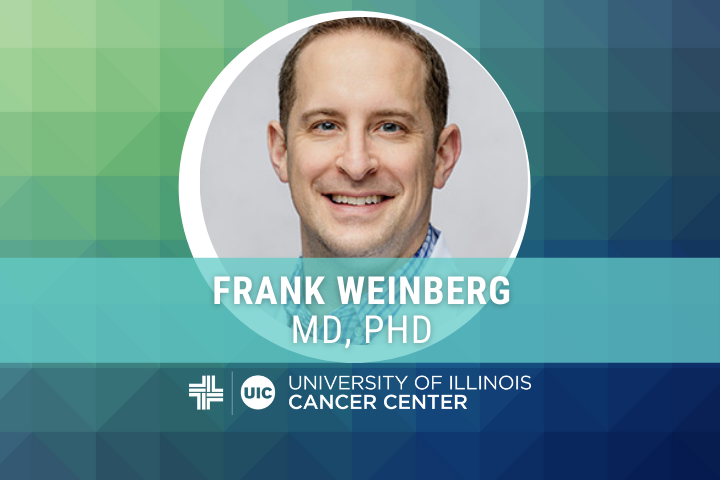
University of Illinois Cancer Center member Frank Weinberg, MD, PhD, is focused on improving outcomes in lung cancer patients treated with immunotherapy, with a special emphasis on their reaction to COVID-19 vaccination.
He is currently collecting blood samples from lung cancer patients who were vaccinated for COVID-19, comparing the tests before and after the injection and how it affects chemotherapy treatments and the body’s immune response.
“We’re studying immunometabolism and attempting to understand if it can be used as a biomarker, and if it can be used to develop new targeted therapies, specifically in lung cancer, which is my specialty,” said Weinberg, assistant professor of hematology and oncology at UI Health and a member of the Cancer Center’s Translational Oncology program.
Lung cancer, both small and non-small cell, is the second most common cancer in both men and women (not counting skin cancer). It occurs mainly in older people – most people diagnosed with lung cancer are aged 65 or older; a very small number of people diagnosed are younger than 45, according to the American Cancer Society. The average age of people when diagnosed is 70.
Lung cancer is the leading cause of cancer death among both men and women, making up almost 25% of all cancer deaths. Each year, more people die of lung cancer than of colon, breast and prostate cancers combined. The American Cancer Society estimates that about 236,740 new cases of lung cancer will be diagnosed in 2022 (117,910 in men and 118,830 in women). The disease will cause about 130,180 deaths (68,820 in men and 61,360 in women).
While an undergraduate student at Cleveland’s Case Western Reserve University, Weinberg was undecided which direction to turn in his professional life. His interest in medicine was piqued after working in a medical laboratory at the University of Chicago one summer. He took his newfound interest into a lab at Case Western and began formulating a career plan with a school counselor.
Upon receipt of his undergraduate degree, Weinberg was accepted into a National Institutes of Health (NIH) program for students prior to entering medical school. The two-year internship gave Weinberg a glimpse into what translational medicine was, shadowing physicians in hospitals who were treating cancer patients enrolled in clinical trials. He was also afforded the opportunity to conduct “real-time” research that impacted the patients’ treatments.
Following his internship, Weinberg enrolled in Northwestern University’s doctorate program, where he earned his degree in molecular and cell biology.
“It was really interesting work, studying cancer metabolism, which was just getting reinvigorated at the time,” Weinberg said. “But I always knew I wanted to pursue a clinical career. That became more evident as my research continued. I love basic science, but I really love seeing how your discovery can transfer to clinical outcomes.”
In 2010, Weinberg enrolled in the University of Illinois College of Medicine. While completing various rotations during medical school, Weinberg felt he was best suited to become a primary care physician. But that changed after treating oncology patients at UI Health and Jesse Brown VA Medical Center.
“There’s just something about caring for oncology patients,” said Weinberg, who returned to UIC after completing a residency and faculty positions at the University of Michigan. “I enjoy being able to create relationships over a long period of time, both with patients and their families. I really enjoy the process of oncology. I had always planned on moving back to Chicago, and UI Health and UIC is a great opportunity for me as I can conduct research and treat patients.”
